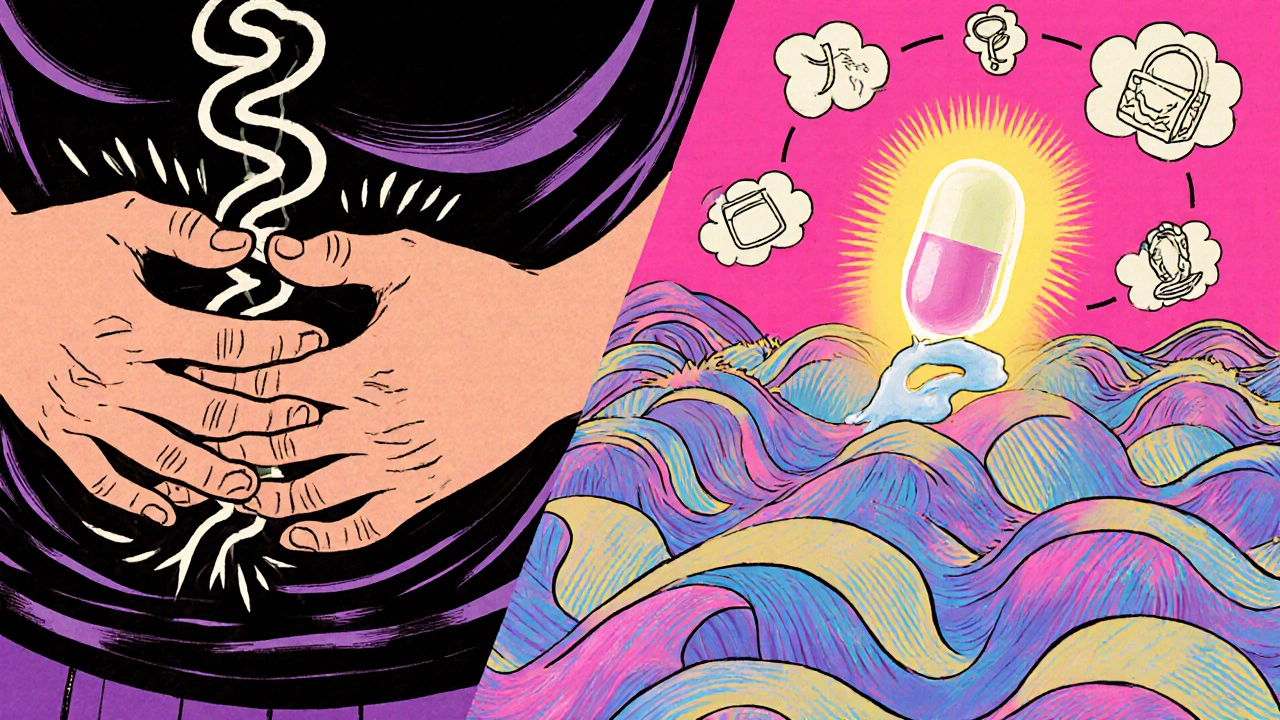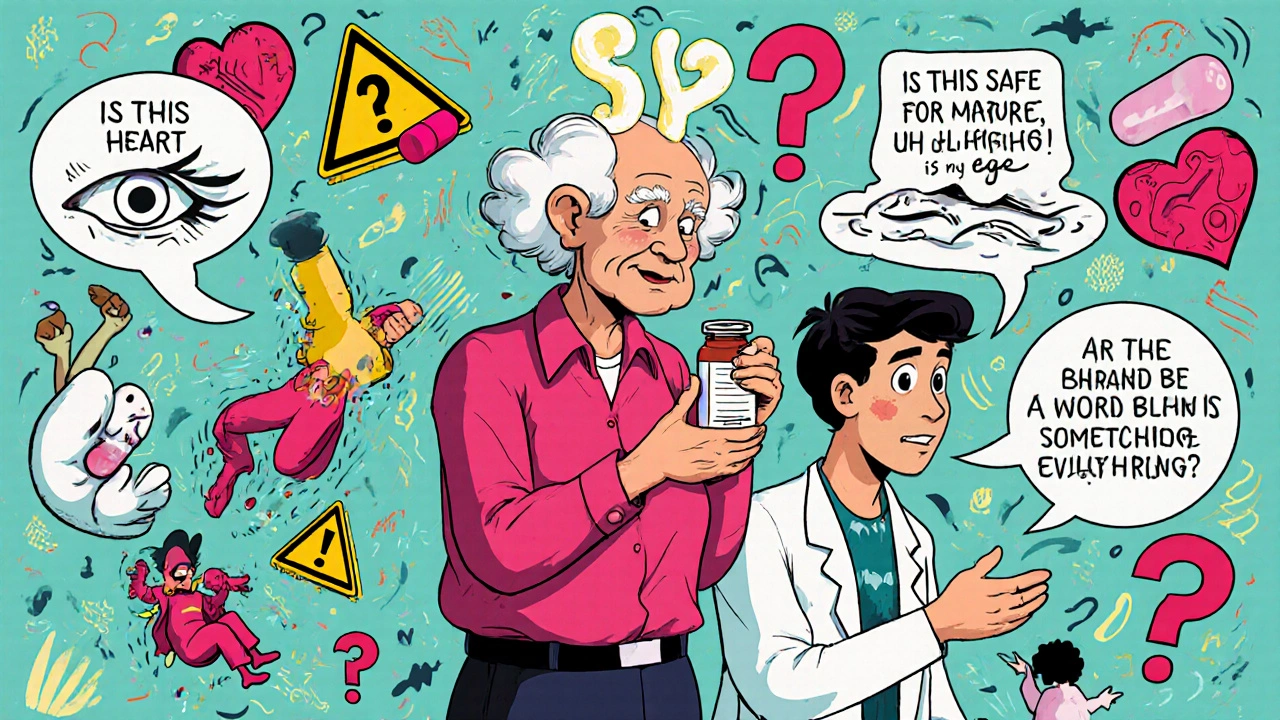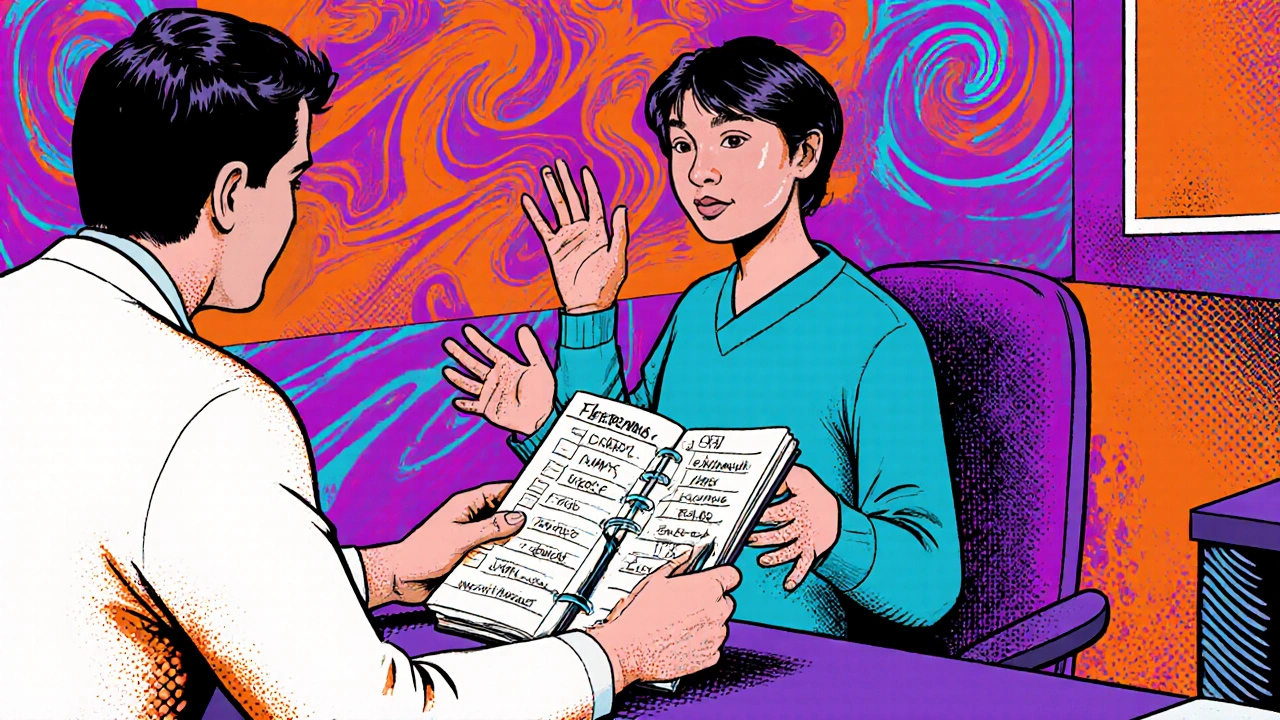If you’ve been dealing with painful stomach cramps, intestinal spasms, or bladder discomfort, you might have been prescribed butylscopolamine. But knowing what it does is only half the battle. The real challenge? Talking to your doctor about it in a way that gets you the care you need. Many people leave the office feeling confused, unsure if they took the right dose, or if their symptoms are even related to the medicine. You don’t have to be one of them.
Start with what you’re feeling
Don’t begin by saying, “I think I need butylscopolamine.” Instead, describe your symptoms clearly and specifically. Doctors hear “stomach pain” all the time-but they need more to connect the dots. Say something like: “I get sharp cramps in my lower belly every time I eat, especially after dairy. They last 20 to 40 minutes and feel like my insides are twisting.” Or: “I have a constant urge to urinate, but when I go, it’s only a few drops-and it hurts.”Write down when the pain happens, how long it lasts, and what makes it better or worse. Did it start after a new medication? After stress? After eating certain foods? These details matter. Butylscopolamine works by relaxing smooth muscles in the gut and bladder, so your doctor needs to know if your symptoms match that pattern.
Be ready to explain why you’re asking about butylscopolamine
Maybe you read about it online. Maybe a friend said it helped. Maybe your last prescription ran out and you’re trying to refill it. Whatever the reason, say it out loud. Don’t assume your doctor knows why you brought it up.Say: “I looked up butylscopolamine because my symptoms match what it’s used for-spasms in the digestive tract.” Or: “My sister takes this for IBS, and it worked for her. I’m wondering if it could help me too.”
This opens the door for a real conversation. Your doctor isn’t judging you for researching on your own. They’re trained to help you use that information wisely. But they need to know where your question came from to give you the right answer.
Ask the right questions about how it works
Butylscopolamine isn’t a painkiller. It doesn’t numb the pain. It stops the muscle spasms that cause the pain. That’s a big difference. Many people expect instant relief like with ibuprofen, but butylscopolamine takes 15 to 30 minutes to kick in-and it only helps if the pain is caused by muscle tightening.Ask: “Is my pain likely caused by spasms, or is it something else-like inflammation or an infection?”
Also ask: “What’s the usual dose? How often can I take it? Is it safe to use every day?”
The standard dose for adults is 10 to 20 milligrams, taken up to three times a day. But if you’re over 65, have glaucoma, or have trouble urinating, your doctor might lower that dose or avoid it entirely. Butylscopolamine can make dry mouth, blurred vision, or constipation worse. If you’re already dealing with those, you need to know before you start.

Discuss what else could be causing your symptoms
Butylscopolamine treats symptoms, not causes. If your cramps are from IBS, it might help a lot. If they’re from Crohn’s disease, diverticulitis, or a blockage, it won’t fix the problem-and could even hide something serious.Ask: “Could this be something that needs a test? Like a stool sample, ultrasound, or colonoscopy?”
Doctors are trained to look for red flags. If you’ve lost weight without trying, have blood in your stool, or the pain is getting worse over time, those aren’t just “bad cramps.” They’re signals that something deeper might be going on. Butylscopolamine won’t help with cancer, infection, or structural issues. And using it without ruling those out could delay diagnosis.
Know the side effects-and what to watch for
Most people tolerate butylscopolamine fine. But some notice dry mouth, dizziness, or mild constipation. These are usually harmless. But if you feel your heart racing, have trouble seeing clearly, or can’t urinate at all, stop taking it and call your doctor. These are signs the drug is affecting your nervous system too much.Also, don’t mix it with other anticholinergic drugs-like some cold medicines, antidepressants, or motion sickness pills. They can add up and cause confusion, extreme dryness, or even hallucinations in older adults.
If you’re over 65, ask: “Is this safe for someone my age?” Studies show older adults are more sensitive to anticholinergic drugs. Even small doses can increase the risk of falls, memory problems, or confusion. Your doctor might suggest a different option.
What if it doesn’t work?
If you take butylscopolamine for a week and feel no improvement, don’t just keep taking it. Go back to your doctor. Say: “I took it as directed, but the cramps are still there. What’s next?”Maybe you need a different medicine. Maybe you need a low-FODMAP diet. Maybe you need to see a gastroenterologist. Butylscopolamine isn’t a magic pill. It’s one tool among many. Your doctor can help you figure out which tool fits your situation.

Keep a symptom and medication log
Bring a simple notebook to your next appointment. Write down:- When the cramps happen (time of day, after meals, during stress)
- How bad they are (on a scale of 1 to 10)
- What you took and when (including butylscopolamine)
- How you felt 30 minutes later
This turns guesswork into data. Instead of saying, “I think it helped a little,” you can say, “I took 20 mg at 7 p.m. after dinner. The cramp dropped from an 8 to a 3 within 25 minutes.” That kind of detail tells your doctor exactly what’s working-and what’s not.
When to push for a second opinion
If your doctor dismisses your symptoms, says “it’s just stress,” and won’t consider butylscopolamine or other options, it’s okay to ask for a referral. Chronic abdominal pain is real. It’s not all in your head. If you’ve had symptoms for more than three months, you deserve a thorough evaluation.Specialists like gastroenterologists or urologists (depending on where the pain is) have seen more cases than your primary care doctor. They know which medications work for which conditions-and which ones don’t.
Final reminder: You’re the expert on your body
Your doctor knows medicine. You know your pain. The best care happens when those two things come together. Don’t let fear, shame, or time pressure stop you from speaking up. Write your questions ahead of time. Bring someone with you if you’re nervous. Take notes during the appointment.Butylscopolamine can be a game-changer-if it’s the right fit. But only if you talk about it clearly, honestly, and confidently. You’re not being difficult. You’re being smart.

Rashmi Mohapatra
November 7, 2025 AT 21:29Abigail Chrisma
November 8, 2025 AT 07:28Ankit Yadav
November 9, 2025 AT 21:56Meghan Rose
November 11, 2025 AT 21:41Steve Phillips
November 13, 2025 AT 03:43Rachel Puno
November 14, 2025 AT 22:46Clyde Verdin Jr
November 16, 2025 AT 04:32Key Davis
November 17, 2025 AT 02:50Cris Ceceris
November 18, 2025 AT 18:24Brad Seymour
November 19, 2025 AT 10:43Malia Blom
November 20, 2025 AT 15:40